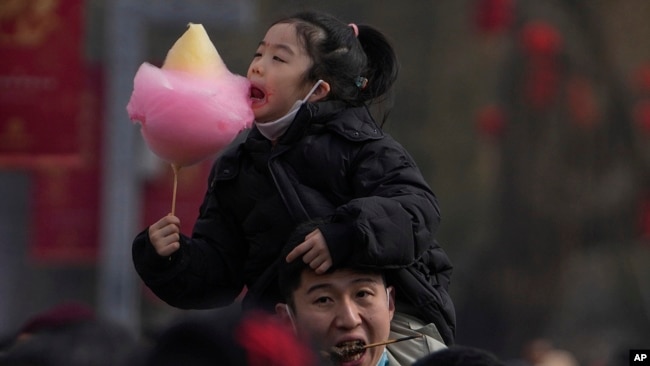경제가 둔화되면서, 중국의 쇼핑객들은 저렴한 대안을 찾고 있습니다
As Economy Slows, China’s Shoppers Look for Affordable Alternatives
페이지 정보
작성자 By Lin Nai-Chuan 작성일 24-02-15 00:23 댓글 0본문

신화통신이 공개한 이 사진에서 관광객들은 2월 중국 중부 후베이성의 시안현에서 음력 설 동안 호수 위에 대나무를 띄워 놀이기구를 즐기고 있습니다
In this photo released by Xinhua News Agency, tourists enjoy a bamboo floating ride on a lake during the Chinese Lunar New Year in Xuan'en County in central China's Hubei Province on Feb. 11, 2024.
타이베이, 타이완 —
Taipei, Taiwan —
경기 둔화로 인해 중국 쇼핑객들은 전통적으로 중국의 가장 중요한 쇼핑 시즌인 올해 춘제 동안 자유로운 소비 습관을 재평가하게 되었습니다.
A slowing economy is prompting Chinese shoppers to reassess their free-spending habits during this year’s Lunar New Year, traditionally the country’s most important shopping season.
분석가들과 쇼핑객들은 올해 특히 젊은 중국 소비자들이 의류, 액세서리, 식품, 전자 제품을 살 때 "가성비"에 더 집중하고 있다고 말합니다.
Analysts and shoppers say that this year, young Chinese consumers especially are focusing more on "cost-effectiveness" when buying clothing, accessories, food, and electronic products.
베이징의 국영 항공사에서 일하는 31세의 쉬(Xu)씨는 과거에는 수입이 많았으며 여행, 오락, 외식에 지출할 것이라고 말합니다. 하지만 팬데믹과 중국의 엄격한 봉쇄 조치 이후, 그녀의 수입은 불안정해졌습니다. 그녀는 생활이 그리 어렵지 않았지만 해외 여행은 더 이상 쉬운 선택이 아니라고 말합니다.
Xu, 31, who works for a state-owned airline in Beijing, says that in the past, her income was high and she would spend on travel, entertainment and eating out. But since the pandemic and China’s strict lockdown measures, her income has become unstable. She says life has not been too difficult but overseas travel is no longer an easy option.
그리고 소비자들은 소비할 것이 적고 가격은 전반적으로 상승하고 있지만, 쉬(Xu)씨는 아직 찾을 수 있는 가격이 있다고 말합니다. 예를 들어, 음식과 서비스의 품질은 변하지 않음에도 불구하고 식당의 단체 식사는 팬데믹 이전에 했던 것의 절반 정도 비용이 듭니다.
And while consumers have less to spend and prices are rising generally, Xu says there are still bargains to be found. Set meals for groups in restaurants, for instance, cost about half of what they did before the pandemic even though the quality of food and service is unchanged.
"당신이 당신의 수입 범위 내에서 산다는 개념을 갖게 되면, 당신은 가격에 민감해질 것입니다"라고 그녀는 말합니다. "현재 시장에서 가장 인기 있는 것들은 기능적인 필요가 있는 것들이고 당신을 멋지게 보이게 만들 수 있지만, 동시에 비용 효율적입니다."
"When you have the concept of living within your means, you will become sensitive to prices," she says. "The most popular things on the market now are those with functional needs and can make you look good, but at the same time, they are cost-effective."
쉬씨는 몇 년 전, 베이징의 젊은이들이 주머니 사정이 그리 깊지는 않지만 유명 브랜드의 명품에 소비하는 "절묘한 가난"을 추구하여 열악한 주거 환경이나 삶의 질을 초래했다고 말합니다. 하지만, 더 이상 그렇게 하는 사람들은 많지 않다고 쉬씨는 말합니다.
Xu says that a few years ago, young people in Beijing pursued "exquisite poverty" —meaning that even though their pockets were not that deep, they spent on luxury goods from famous brands — resulting in poor housing conditions or quality of life. But, she says, not many people do that anymore.

2월 베이징에서 열린 춘절 이틀째 행사에서 한 남성이 룽탄공원 사찰 박람회를 방문하면서 아이를 어깨에 짊어지고 있습니다
A man carries his child on his shoulder as they visit the Longtan Park's temple fair during the second day of Lunar New Year celebrations in Beijing, Feb. 11, 2024.
쉬(Xu)씨는 VOA 북경어가 이 주제에 대해 더 자유롭게 말할 수 있도록 자신의 전체 이름을 사용하지 말 것을 요청했습니다. 경제는 더 많은 도전에 직면하면서 중국에서 또 다른 민감한 문제가 되었습니다.
Xu requested that VOA Mandarin not use her full name so she could speak more freely on the topic. The economy has become another sensitive issue in China as it faces more challenges.
중국은 지난해 엄격한 코로나19 팬데믹 통제가 종료된 후 경제가 회복되기를 바랐지만, 대신 실업률 상승, 물가 상승, 임금 하락 등 다양한 문제로 어려움을 겪고 있습니다.
China had hoped that its economy would bounce back following the end of strict COVID-19 pandemic controls last year, but instead it is grappling with a range of problems including higher unemployment, rising prices and falling wages.
33세의 웨이(Wei)는 상하이(Shanghai)의 국영 은행에서 일하고 있습니다. 그녀는 사안의 민감성 때문에 자신의 풀네임을 사용하기를 원하지 않았습니다. 그녀는 쇼핑몰의 빈 매장의 경기 둔화와 온라인 및 저렴한 고품질 제품의 전자 상거래 사이트로의 전환의 징후를 볼 수 있다고 말합니다.
Wei, 33, works at a state-owned bank in Shanghai. She did not want to use her full name due to the sensitivity of the issue. She says one can see the signs of the economic slowdown in the vacant stores in shopping malls and the shift to e-commerce sites online and low-price high-quality products.
"요즘 사람들은 예전만큼 명품을 소비하는 것에 관심이 많지 않은데, 이는 이해할 수 있습니다. 미래 경제에 대한 기대가 그리 좋지 않을 때, 여러분은 분명히 현재의 모든 돈을 비싼 상품에 소비하고 싶지 않을 것입니다," 라고 웨이가 말했습니다.
"Nowadays, people are not as keen on consuming luxury goods as before, which is understandable. When your expectations for the future economy are not so good, you definitely don't want to spend all your current money on expensive goods," Wei said.
그녀는 소비자들이 비용에 대해 보다 합리적이 됨에 따라 전자 상거래 플랫폼과 오프라인 브랜드 모두 고품질의 저렴한 대안을 출시하고 있다고 말합니다.
She says both e-commerce platforms and offline brands are launching high-quality, affordable alternatives as consumers become more rational about cost.
중국은 오랫동안 소비자들에게 현지 제품 구매를 권장해 왔으며, 작년 말 경제 고위급 회의에서 중국 지도자들은 2024년 내수 진작을 핵심 목표로 삼았습니다.
China has long encouraged consumers to buy local products and at a high-level meeting on the economy late last year, the country’s leaders made boosting domestic consumption a key goal for 2024.
관영 신화통신에 따르면 중국 상무부는 춘절을 앞두고 차량, 가전제품, 가전제품 구매를 늘리기 위한 더 많은 조치를 시행한다고 발표했습니다.
Ahead of the Lunar New Year, China’s Commerce Ministry announced it was rolling out more measures to boost the purchase of vehicles, household appliances and home furnishings, according to the official Xinhua news agency.
청콩 경영대학원의 천신레이 마케팅 교수는 중국의 소비감소에 대해 사람들이 너무 많이 읽어서는 안 된다고 말합니다.
Chen Xinlei, a professor of marketing at Cheung Kong Graduate School of Business, says people shouldn't read too much into consumption downgrades in China.
그는 미국과 일본에서 중국으로 할인점이 들어온 점을 언급하며 저렴한 가격은 세계적인 추세이며 가성비는 중국에만 있는 것이 아니라고 말합니다.
He says that low prices are a global trend, and cost-effectiveness doesn't only exist in China, noting that discount stores came to China from the United States and Japan.
그는 소셜 미디어 플랫폼의 증가가 젊은 중국인들이 자신의 정체성을 찾고 사치품을 피하는 것을 도왔다고 말합니다. 그는 그것은 그들이 사치품을 살 여유가 없어서가 아니라 그들이 개성이 부족하기 때문이라고 덧붙였습니다.
He says the rise of social media platforms has also helped young Chinese find their own identity and shun luxury goods. It is not because they cannot afford luxury goods, he adds, but because they lack individuality.
"돈이 안 되는 사람들은 '부럽습니다. 에르메스 가방을 갖고 싶지만 그럴 여유가 없습니다.'라고 말하곤 했습니다. 요즘, 많은 젊은이들이 '나는 이것이 필요 없는데 왜 이것이 필요합니까?'라고 말합니다."라고 첸(Chen)은 말합니다.
"People who can't afford it used to say, 'I'm envious. I hope to have a Hermès bag, but I can't afford it.' Nowadays, many young people say, 'I don't need this, why do I need it?'" Chen says.
"이것은 국내 제품과 소위 트렌디한 브랜드의 증가로 이어졌습니다. 이것은 사실 그들이 그들의 독특한 요구를 만족시키기 위해 다른 정체성을 찾는 방법입니다."
"This has led to the rise of domestic products and so-called trendy brands. This is actually a way for them to find other identities to satisfy their unique needs."
출처 : VOANews
댓글목록 0
등록된 댓글이 없습니다.

















